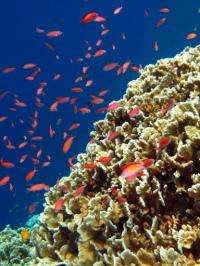Carbon dioxide affecting fish brains: study

Rising human carbon dioxide emissions may be affecting the brains and central nervous systems of sea fish, with serious consequences for their survival, according to new research.
Carbon dioxide concentrations predicted to occur in the ocean by the end of this century will interfere with fishes' ability to hear, smell, turn and evade predators, the research found.
The Australian Research Council's Centre of Excellence for Coral Reef Studies said it had been testing the performance of baby coral fish in sea water containing higher levels of dissolved CO2 for several years.
"And it is now pretty clear that they sustain significant disruption to their central nervous system, which is likely to impair their chances of survival," said Phillip Munday, a professor who reported the findings.
In a paper published in the journal Nature Climate Change, Munday and his colleagues also detail what they say is world-first evidence that high CO2 levels in sea water disrupts a key brain receptor in fish.
This causes marked changes in their behaviour and sensory abilities.
"We've found that elevated CO2 in the oceans can directly interfere with fish neurotransmitter functions, which poses a direct and previously unknown threat to sea life," said Munday.
The team began by studying how baby clown and damsel fishes performed alongside their predators in CO2-enriched water.
They found that while the predators were somewhat affected, the baby fish suffered much higher rates of attrition.
"Our early work showed that the sense of smell of baby fish was harmed by higher CO2 in the water, meaning they found it harder to locate a reef to settle on or detect the warning smell of a predator fish," said Munday.
The team then examined whether fishes' sense of hearing -- used to locate and home in on reefs at night, and avoid them during the day -- was affected.
"The answer is, yes it was. They were confused and no longer avoided reef sounds during the day. Being attracted to reefs during daylight would make them easy meat for predators."
The research also showed that the fish also tended to lose their natural instinct to turn left or right -- an important factor in schooling behaviour.
"All this led us to suspect it wasn't simply damage to their individual senses that was going on, but rather that higher levels of carbon dioxide were affecting their whole central nervous system."
Munday said around 2.3 billion tonnes of human CO2 emissions dissolve into the world's oceans every year, causing changes in the chemical environment of the water in which fish and other species live.
(c) 2012 AFP










.jpg)








